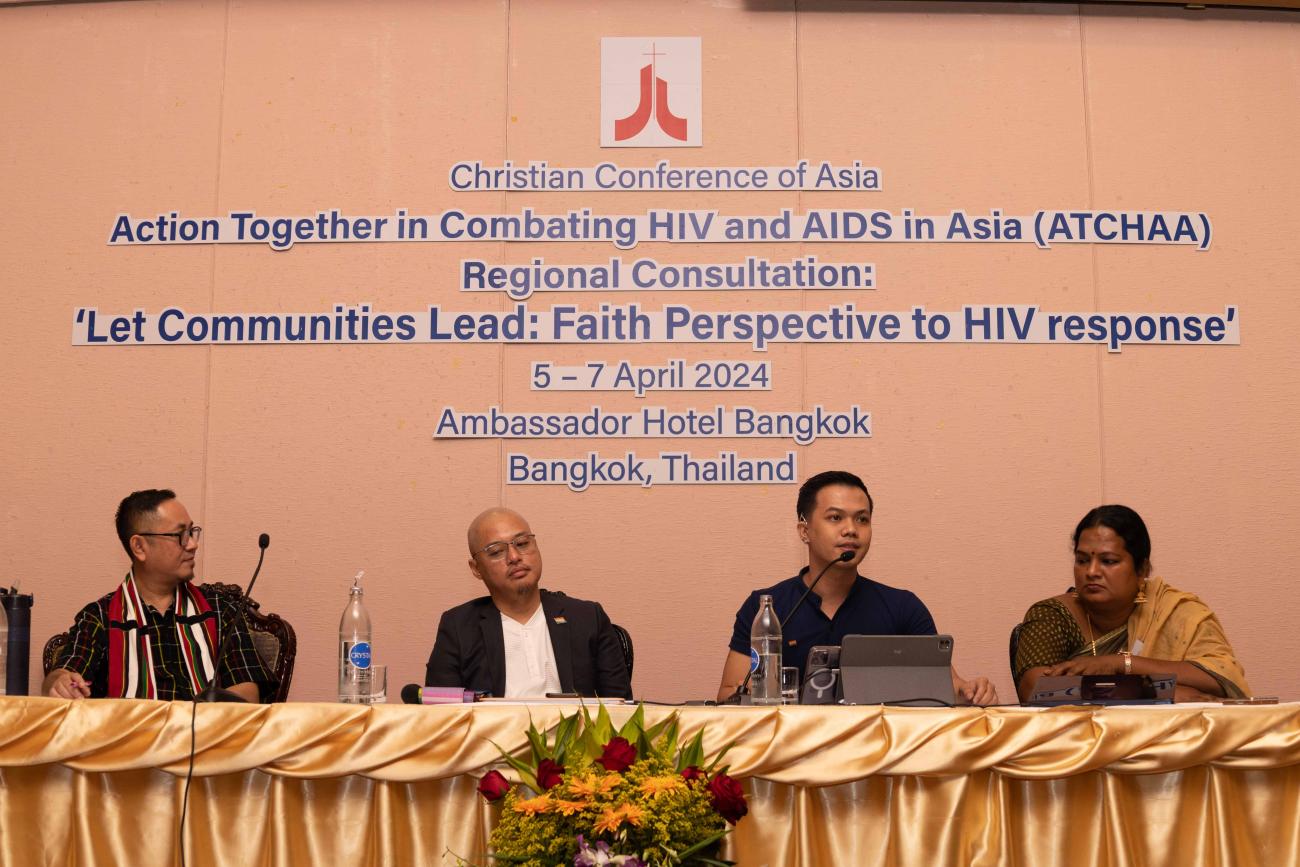CCA Consultation calls for faith communities to intensify voices of PLHIV, advocate for awareness and acceptance

Day 3 of the ATCHAA Regional Consultation: Session on Addressing HIV and vulnerabilities,Stigma and Discrimination–Role of Church and Faith Organisations
Bangkok, Thailand: Church workers, healthcare workers, social activists, representatives of people living with HIV and AIDS (PLHIV) networks, and non-governmental organisations (NGOs) discussed community-led strategies for effective responses to combat HIV and AIDS in Asia.
The three-day regional consultation, organised by the Christian Conference of Asia (CCA), which concluded on 7 April 2024, was attended by about 60 participants from across Asia.
Sunshine Dulnuan, a professor of systematic theology and dean of students at St. Andrew’s Theological Seminary in Manila, underscored the importance of sharing the stories of people living with HIV and AIDS and advocating for awareness and acceptance. For her, these stories have the potential to ignite significant change and foster greater understanding and compassion within our churches and beyond.
Ms Dulnuan, during her theological reflection session on the text from John 4:1–42, made the following observations: “Despite being initially ostracised, the Samaritan woman’s actions bridged divides and brought reconciliation. Her journey symbolises redemption and the transformative power of encountering Jesus. Parallels can be drawn to individuals living with HIV who, like her, can become agents of change within their communities. By sharing their stories and advocating for awareness and acceptance, they embody empowerment and transformation.”
“Empowered by her transformative encounter, the woman became a catalyst for change within her community,” Ms Dulnuan added. She then emphasised that people living with HIV possess a wealth of transformative narratives capable of profoundly impacting communities. She stressed that people living with HIV and AIDS can also become agents of transformation themselves.
In the session ‘Addressing HIV and vulnerabilities, stigma, and discrimination’, three young voices narrated the role of church and faith organisations in advocating for the rights of the muted and discriminated PLHIV.
Rev. Joseph San Jose, a pastor from the OpenTable Metropolitan Community Church (MCC) in Manila, Philippines, explained the significance of inviting people living with HIV and AIDS into the churches to share their experiences and struggles. “Show their face and let their voices be heard. Do not talk about them without them,” said Rev. San Jose during his talk.
He pointed out that churches must be willing to unlearn and learn and must look at doctrine, morals, and theology in new and different ways, realising the gospel in today’s context. “Our commitment is to Jesus Christ, who is also embodied in each person living and struggling with HIV or AIDS,” said Rev. San Jose as a conclusion to his sharing.
Arisdo Gonzalez, an activist and member of the Pelangi Nusantara and Pesona Bumi Pasundan Foundation, clearly emphasised that silence and neutrality on stigma and discrimination are wrong acts. He called on the participants from faith organisations to take sides with the vulnerable, especially the people living with HIV and AIDS.
“As Jesus touched lepers and Lady Diana touched people with HIV, we need to reflect on ourselves together to do the same: to break down walls, embrace the vulnerable, and love them sincerely,” shared Gonzalez, whose organisation’s advocacy work is centred on amplifying voices in defence of human rights, sexuality and faith, and sexual health through social media content.
Dr Inba Ignatius from the National Ecumenical Forum for Gender and Sexual Diversity (NEFGSD) in India shared about the importance of providing opportunities and open spaces for people as a means to empower people, even those who are marginalised, especially transgender people and PLHIV. Dr Ignatius talked about how faith organisations can impact the lives of the vulnerable by affording them respect, friendship, and support, especially from family, friends, the church, and society.
Dr Inba Ignatius, who represents the Snegidhen and Snegidhi Trust, conveyed how the organisations she belongs to have responded to the spiritual and practical needs of transgender people and PLHIV through the founding of the Trans Shelter, a care facility for the elderly and HIV-positive transwomen, and the Trans Chapel, which serves as a free space for the faith of transpeople to grow and be affirmed in their belief in God. She also mentioned providing training in tailoring, opportunities for cattle farming, and the opening of tiffin centres.
Points of action that emerged during group discussions in the sessions on ‘Pastoral Care and Accompaniment: Strategies for Effective Response’ and ‘Health, Healing, and HIV: Communities Leading Action to Combat HIV and AIDS in Asia’ included:
- Education initiatives, with more encounters with PLHIV to humanise and familiarise experiences, as well as incorporating topics on gender, sexuality, and HIV into seminary curricula;
- Ecumenical efforts, such as initiating conversations within church communities about HIV, learning from each other’s experiences, and continuing conversations between groups to evaluate and communicate effectively;
- Encourage awareness and prevention meetings, partnering with NGOs, and engaging in dialogue on HIV issues within churches;
- Ensure people-centred approaches with zero discrimination and stigma, and advocating for government policies prioritising HIV prevention, treatment, and support services;
- Enable safe spaces within churches for sharing stories, fostering empathy, and combating discrimination, along with implementing psychosocial interventions to support people living with HIV;
- Embrace different standpoints, theologies, and beliefs that churches hold, while acknowledging that all can still serve and care together grounded in God’s inclusive love.
The Asian Regional Conference on ‘Let Communities Lead: Faith Perspectives to HIV Response’ from 5 to 7 April 2024 in Bangkok, Thailand, is part of the ongoing programme of the CCA’s Action Together in Combating HIV and AIDS in Asia (ATCHAA), which is geared towards equipping member churches and councils to effectively respond to HIV and AIDS issues particularly in Asia, home today to 6.5 million people living with HIV and AIDS.










